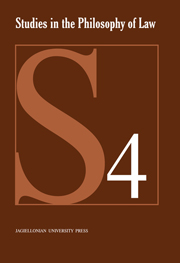Book contents
- Frontmatter
- Contents
- Preface
- Six Causes of the Dispute over Legal Bioethics
- Bioethics and Legal Philosophy
- The Outline of the Subject of Biojurisprudence
- Law and Biotechnology
- The Ethical Significance of Evolution
- Human Nature after Darwin
- The Notion of the Person in Bioethical Debates
- The Roots of Normativity. From Neuroscience to Legal Theory
- Why No One Should Ever Win the Nobel Prize: Neurolaw, Reward and Punishment
- Is There Anybody Who Really Wants to Live Forever? The Significance of Mortality
- The Slippery Slope Arguments Against the Legalization of Physician-Assisted Suicide
- Ethical Problems of Hematopoietic Stem Cells Transplantation
- Notes about the Authors
Why No One Should Ever Win the Nobel Prize: Neurolaw, Reward and Punishment
Published online by Cambridge University Press: 05 September 2014
- Frontmatter
- Contents
- Preface
- Six Causes of the Dispute over Legal Bioethics
- Bioethics and Legal Philosophy
- The Outline of the Subject of Biojurisprudence
- Law and Biotechnology
- The Ethical Significance of Evolution
- Human Nature after Darwin
- The Notion of the Person in Bioethical Debates
- The Roots of Normativity. From Neuroscience to Legal Theory
- Why No One Should Ever Win the Nobel Prize: Neurolaw, Reward and Punishment
- Is There Anybody Who Really Wants to Live Forever? The Significance of Mortality
- The Slippery Slope Arguments Against the Legalization of Physician-Assisted Suicide
- Ethical Problems of Hematopoietic Stem Cells Transplantation
- Notes about the Authors
Summary
Stockholm, Sweden, at the Presentation of the Nobel Prizes, 10 December 2012. The speech of Dr. Solomon Meyerowski.
Your Majesties, Your Royal Highnesses, Ladies and Gentlemen,
It is with great regret that I must refuse the great honor that you have conferred upon me in this magnificent hall this evening. This year's prize in medicine, twelve million Swedish kroner, would go a long way toward funding the ongoing brain research that I have been doing and for which you have honored me tonight. But it is precisely that research that compels me to return this medal to you, and to ask the Nobel Prize Committee to retain the prize money and confer it upon someone they feel is worthy of it, if its members conclude, after my address, that they should continue to offer such prizes in the future. I fondly hope that henceforth they will no longer award them, and that the committee itself, and indeed the Foundation, will be disbanded and the funds from which the prizes are awarded will be liquidated. For if we believe in rational thought at all – and of course we do, or we would not be honoring its foremost exponents, then we must conclude that the awarding of such prizes is the height – or should I say, the depth – of irrational, unscientific behavior, and is a terrible example to set for new generations.
- Type
- Chapter
- Information
- Studies in the Philosophy of LawLegal Philosophy and the Challenger of Biosciences, pp. 123 - 132Publisher: Jagiellonian University PressPrint publication year: 2010



